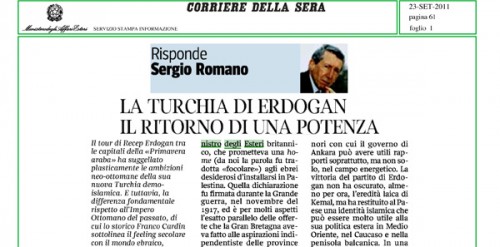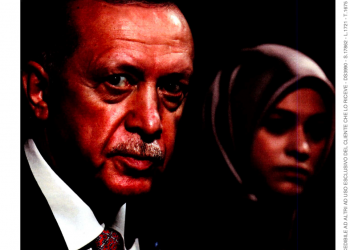
Recep Erdogan’s tour through the capitals of the “Arab Spring” sealed the neo-ottoman ambitions of his new demo-Islamic Turkey.
Nevertheless, the fundamental difference with the past Ottoman Empire, of which the historian Franco Cardin underlines the secular feeling with the Jewish world, resides exactly in the different attitude assumed by Ankara towards what once was the Zionism – Turkey’s ally against Russia during the Great War – and that starting from 1948 assumed the form of the Israel’s State, up to not a long time ago privileged partner of Turkish military sphere’s. What of this Copernican revolution imprinted by Erdogan in the foreign politics answers contingent grounds (first of all the Israeli aggression to the Freedom Flotilla) and what, instead derives from a precise strategic and ideal vision?
Emanuele Ciabattini- emanuelekarol@yahoo.it
Dear Ciabattini,
I don’t think that Turkey can be considered “a historic ally of Zionism”. The document that mostly contributed to the international legitimacy of the Zionist movement was the “Balfour declaration”, from the name of the British Minister of Foreign Affairs, who had promised a home to the Jews who desired to settle in Palestine.
That declaration was signed during the Great War, on November 1917, and is for many aspects the exact parallel of the offers that Great Britain had made for the independence aspiration of the Arab provinces governed by the Ottoman Empire: two hardly compatible politics, but useful, in that moment, to extend in Middle East the anti-Turkish front. The Turkish-Israeli alliance in the last decades has other motivations.
The Laic State founded by Kemal Ataturk didn’t accept with pleasure Nasser’s and his imitator’s nationalism and Pan-Arabism. He distrusted the national politics inspired by the common belonging to the Muslim faith. He felt on the eastern borders the threatening burden of the soviet presence. He considered USA the only power capable to guarantee his safety. He saw in Israel a useful partner on an economic base (an interchange, recently, equal to three and a half billion dollars) and above all on the base of a military collaboration.
The situation today is quite a lot different. The URSS doesn’t exist anymore, the cold war is finished, the old soviet space around Turkey is populated by minor States with who Ankara’s government can have useful connections especially, but not only, on the energetic field.
The victory of Erdogan’s party didn’t obscure, at least for now, Kemal’s laic heritage, but returned to the Country an Islamic identity that can be useful for its own foreign politics in Middle East, in Caucasus and in the Balkan peninsula. In a small collective work dedicated to Turkey and published by the publisher Vox Populi, in Trento, the Minister of Foreign Affairs Ahmet Davoutoglu didn’t hesitate to write that “the Muslim communities , heritage of the Ottoman epoch, are the fundament of the Turkish political action in the Balkans”. This means that the new Turkey wants to be in syntony with the aspirations of the Arab and Islamic societies. It seems to me that these considerations are enough to explain why Turkey defends Palestinians from Gaza and considers its contacts with Israel less important than the role it intends to have in the Middle East.
23 September 2011 – Corriere della Sera – Sergio Romano

















